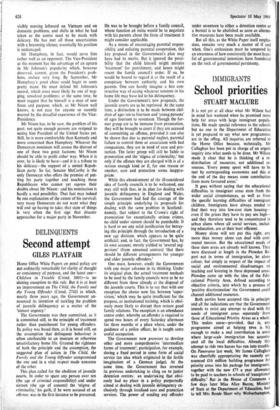Second attempt
DELINQUENTS GILES PLAYFAIR
Home Office White Papers on penal policy are not ordinarily remarkable for clarity of thought or consistency of purpose, and the latest one— Children in Trouble (Cmnd. 3601)—is no shining exception to this rule. But it is at least an improvement on The Child, the Family and the Young Offender (Cmnd. 2742) in which, nearly three years ago, the Government an- nounced its intention of tackling the problem of juvenile delinquency as a matter of the 'utmost urgency.'
The Government was then committed, as it is committed still, to the principle of treatment rather than punishment for young offenders. Its policy was based then, as it is based still, on the assumption that delinquent behaviour is often attributable to an insecure or otherwise unsatisfactory home life. Granted the rightness of both the principle and the assumption, the suggested plan of action in The Child, the Family and the Young Offender compromised the one and in a vital respect made nonsense of the other.
This plan called for the abolition of juvenile courts. In order to spare any person over ten (the age of criminal responsibility) and under sixteen (the age of consent) the 'stigma of criminality,' his guilt, if he were accused of an offence, was in the first instance to be presumed. He was to be brought before a family council, whose function ab initio would be to negotiate with his parents about the form of treatment it might consider applicable.
As a means of encouraging parental respon- sibility and enlisting parental cooperation, this key proposal in the Government's plan may have had its merits. But it ignored the possi- bility that the child himself might mistake 'treatment' for punishment, and hence might resent the family council's order. If so, he would be bound to regard it as the result of a conspiracy between authority and his own parents. One can hardly imagine a less con- structive way of easing whatever tensions in his home life may have led to his delinquency.
Under the Government's new proposals, the juvenile courts are to be reprieved. At the same time, a distinction is to be made between chil- dren of ages ten to fourteen and 'young persons' of ages fourteen to seventeen. Though the for- mer group are to be immune from prosecution, they will be brought to court if they are accused of committing an offence, provided it can also be shown that due to parental neglect, parental failure to control them or association with bad companions, they are in need of care and pro- tection. The latter group will still be liable to prosecution and the 'stigma of criminality,' but only if the offence they are charged with is of a serious enough kind or if, for one reason or another, care and protection seems inappro- priate.
While this abandonment of the ill-considered idea of family councils is to be welcomed, one may still wish that, in its plan for dealing with juvenile delinquency in England and Wales, the Government had had the courage of the simple principle underlying its proposals for dealing with the same problem in Scotland: namely, that subject to the Crown's right of prosecution for exceptionally serious crimes, no child under sixteen should be punishable. It is hard to see any solid justification for betray- ing this principle through the introduction of a new age division, which appears to be quite
artificial; and, in fact, the Government has, by its own account, merely yielded to 'several sug-
gestions' (from unnamed sources) 'that there should be different arrangements for younger and older juvenile offenders.'
One must, however, credit the Government with one major advance in its thinking. Under its original plan, the actual treatment methods to be used by the family councils were to be no different from those already at the disposal of the juvenile courts. This is to say that with one exception the choice now lies between 'super- vision,' which may be quite insufficient for the purpose, or institutional training, which is obvi- ously more likely to disrupt than restore good family relations. The exception is an attendance centre order, whereby an offender is required to spend two hours of every Saturday afternoon for three months at a place where, under the guidance of a police officer, be is taught some useful occupation.
The Government now promises to develop other and more comprehensive 'intermediate forms of treatment'; participation, for example, during a fixed period in some form of social service (an idea which originated in the fertile imagination of a German judge). At the same time, the Government has reversed its previous undertaking to cling on to junior detention centres: an undertaking that obvi- ously had no place in a policy purportedly aimed at dealing with juvenile delinquency ex- clusively through localised care and protection services. The power of sending any offender under seventeen to either a detention centre or a borstal is to be abolished as soon as alterna- tive resources have been made available.
But all this, as the White Paper itself empha- sises, remains very much a matter of if and when. One's enthusiasm must be tempered by an awareness of how consistently the most hope- ful of governmental intentions have foundered on the rock of governmental parsimony.






































 Previous page
Previous page